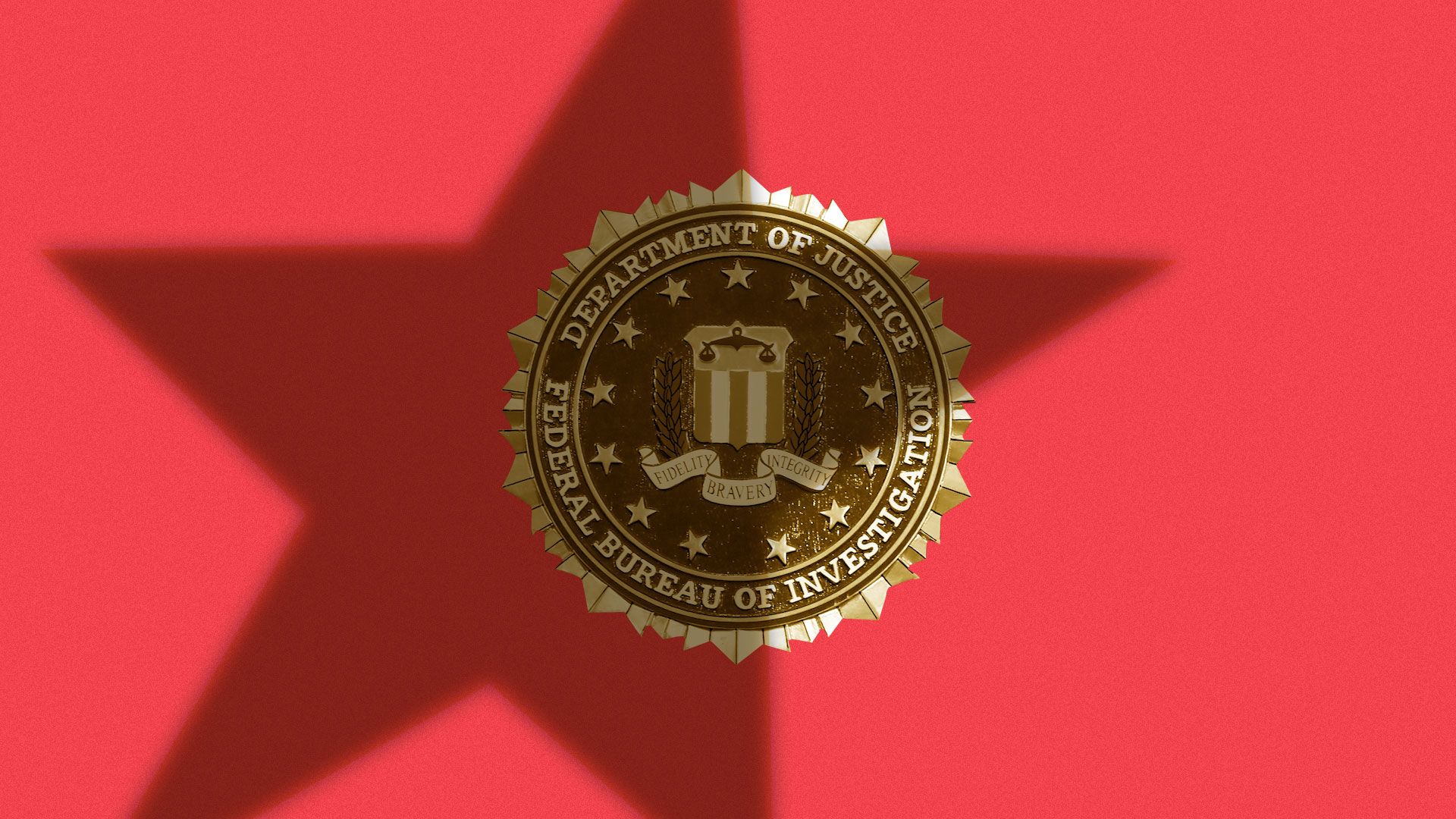Exclusive: How the FBI combats China's political meddling
Add Axios as your preferred source to
see more of our stories on Google.

Illustration: Eniola Odetunde/Axios
In May 2019, the FBI's Foreign Influence Task Force quietly added a unit aimed at countering China's political influence in the United States. In an exclusive interview, an FBI official reveals for the first time the bureau's approach to countering China's interference in local and state politics.
Why it matters: "This is ultimately a potential systemic challenge to the world order that we've had for the past several decades," the FBI official tells Axios of China's efforts.
The big picture: There is a growing body of evidence that China devotes massive resources to influencing the political environments of foreign countries, including the United States.
- Unlike Russia, the Chinese Communist Party focuses on cultivating long-term relationships and using economic levers to coerce people into compliance, rather than targeting a specific election event.
- “For a long time we focused on the federal level, but we really have come to understand that the Chinese are playing a long game with the political influence in this country," the FBI official said. "So we have spent a lot more time and energy trying to understand the state and local people-to-people influences going on."
- Over the weekend, Secretary of State Mike Pompeo warned that China is targeting U.S. local and state officials.
China's influence playbook centers around economic leverage stemming from its growing wealth. That includes:
- The use of economic “carrots and sticks” at the local and state levels.
- “Conduit contributions” to illegally funnel Chinese funds into U.S. politics.
- The use of Chinese government-linked proxies to cultivate relationships of dependency with a variety of American individuals and organizations.
- And it happens at every level of government and society. “The toolkit works just as well on a mayor as it would work on somebody in higher elected office," the official said.
The FBI task force's threshold for determining what counts as malign foreign influence is a four-word rubric: “subversive, undeclared, criminal and coercive.” The FBI official, who spoke to Axios anonymously, defined the terms:
- Subversive: "Activities that are undermining democratic processes, or people's ability to cast a vote."
- Undeclared: "Any activity where the hand of the government, the hand of the foreign government is opaque, is non-transparent to the target audience.”
- Criminal: "There's a suite of election crimes in the U.S. And we're concerned about those crimes. .. So campaign finance violations, this is a big part of what we're concerned about — foreign money entering U.S. political races."
- Coercive: "If there is some sort of quid pro quo, some sort of economic carrots and stick, it's a tool that the Chinese use quite a lot.”
The focus is on party-connected actors, the official said.
- “We're certainly not looking at, you know, all Chinese students or all Chinese Americans," said the official. “This isn't something that we only see happening with ethnic Chinese.”
How the task force works: The initiative, which is part of the FBI's Foreign Influence Task Force, is housed within the agency's counterintelligence division, with embeds from the criminal investigative, cyber and counterterrorism divisions.
- The task force investigates illegal activity and provides defensive briefings — essentially a way to educate companies, organizations, academic institutions and government officials about the potential risks of specific situations.
- The bureau is seeing an "increased demand signal" for briefings and similar engagement "from academic partners, from the private sector, from our U.S. government customer and policymakers," the official said.
Their advice: Do everything possible to manage risk.
- That means understanding where funding comes from and any organizational ties back to China, as well as engaging in secure travel practices with personal electronic devices and business laptops.
The bottom line: China is increasing its efforts to hold sway over cash-strapped local and state governments.
- Companies and organizations must aim for smarter engagement to lessen the risk because “most folks who are already engaged with some aspects of the Chinese government or with a Chinese institution can't just say no,” the official said.
Go deeper: China’s playbook for hooking local governments
Editor's note: This story has been updated to clarify the China-focused unit's connection to the FBI's Foreign Influence Task Force.
